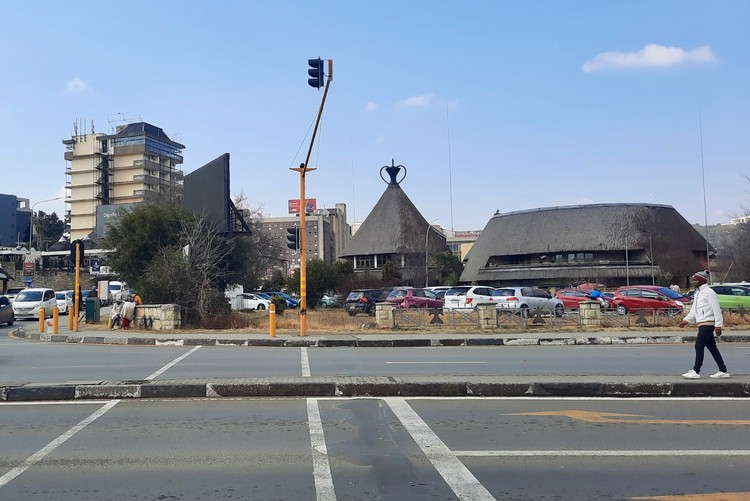
26 July 2025
The famous Basotho hat building along Kingsway Road in central Maseru. Photo: Sechaba Mokhethi
Lesotho is facing economic and public health crises triggered by cuts in foreign aid and harsh US trade tariffs. The small, landlocked kingdom is struggling with high unemployment and fresh job losses.
According to an African Development Bank (AfDB) Country Focus Report on Lesotho released last week, the country’s economic growth of 2.4% in 2024 is expected to fall to just 1.1% this year and 0.5% in 2026.
The report says the slowdown is driven by declining Southern African Customs Union revenues, a decrease in foreign aid, and rising trade-related risks (notably the new, prohibitively high US trade tariffs), and the cancellation of the $300-million Millennium Challenge Corporation second five-year compact.
Aid cuts have hit Lesotho’s health sector hard. The sudden termination of US aid programs has resulted in the loss of about 1,500 healthcare jobs, according to the report, and has severely undermined efforts in prevention, treatment, and outreach for HIV. Lesotho has one of the highest HIV prevalence rates globally, with over 20% of the adult population living with the virus.
What makes these cuts even more damaging is Lesotho’s already underfunded health system. The report says Lesotho now has only 21 health workers per 10,000 people, far below the World Health Organisation’s recommended minimum of 44.
At the same time, Lesotho’s key export sector — textiles and apparel — is under threat. The US has imposed a 50% tariff on Lesotho, temporarily reduced to 10% until 1 August. While this reduction offers some relief, AfDB warns that the long-term consequences could be severe.
Lesotho’s textile industry has long depended on duty-free access to US markets, which make up 47% of its shipments, valued at over $200-million annually, and account for nearly 13% of GDP. The AfDB warns that the tariffs could lead to a 20 to 30% decline in orders, a loss of over R1-billion in exports.
“This could push GDP growth below 1%, especially if factory closures or layoffs increase,” the report says. “Lesotho may face further declines in investment, factory relocations, and job losses in its already fragile manufacturing sector, which could reduce tax revenue.”
The AfDB warns of increased rates of poverty, which, together with inequality, are major issues in Lesotho.
The report warns that without quick and coordinated policy actions, Lesotho could face a surge in social unrest and poverty.
The AfDB urges Lesotho to act swiftly. Economic diversification, investing in skills and infrastructure, and expanding regional trade, especially through the African Continental Free Trade Area (AfCFTA), are essential.
Tax reform and debt management programmes, supported by AfDB, are already underway. But more action is urgently needed.
To keep the textile sector viable, the report recommends improving quality standards, logistics, and worker skills to meet changing global market demands. It also calls for accelerating regional trade efforts under AfCFTA and encouraging entrepreneurship in non-textile industries.
“Lesotho could reorient its production towards regional markets and gradually reduce its exposure to US policy shocks,” the report suggests.